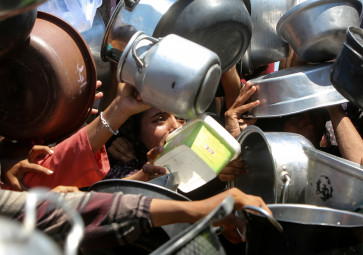Popular Reads
Top Results
Can't find what you're looking for?
View all search resultsPopular Reads
Top Results
Can't find what you're looking for?
View all search resultsMaking reproductive rights a global priority
On April 5, the world began the 1,000-day countdown to the 2015 Millennium Development Goals (MDGs) deadline
Change text size
Gift Premium Articles
to Anyone
O
n April 5, the world began the 1,000-day countdown to the 2015 Millennium Development Goals (MDGs) deadline. Created in 2000, the MDGs spurred action from governments, international organizations, and civil
society.
In recent years, we have cut the global poverty rate in half, reduced the prevalence of deadly diseases, improved sanitation, narrowed the gender gap, and more.
Although we have made progress toward these goals, there is still much to be done, especially for the girls and women of the Muslim world.
Despite the ample evidence that ensuring the wellbeing of girls and women spurs development, gender equality indicators in many majority-Muslim countries are some of the lowest in the world.
If we are to continue making progress toward the MDGs, we must prioritize the health and rights of our Muslim mothers, wives, sisters, and daughters everywhere ' including those in Southeast Asia.
The region is home to almost a quarter of the world's Muslims. Indonesia, Malaysia and Brunei are all majority-Muslim nations, and the Philippines and Thailand have significant Muslim populations as well.
While these countries and others in the region have made progress towards the MDGs for their girls and women, more commitments should be made to ensure this progress is sustained, and even increased.
It has been shown time and time again that we can accelerate progress toward the MDGs when we invest in girls' and women's health and rights, including their rights to reproductive health.
When women have access to contraceptives, maternal and child mortality rates are greatly reduced; sexually transmitted infections (STIs) are prevented; the number of safe and unsafe abortions is lowered; and pregnancy and birth-related complications are avoided.
Girls and women are more likely to stay in school and spend more time in the workforce when they are able to plan their pregnancies. All of this helps us close the gender gap, reduce poverty, spur economies and stabilize nations.
Yet women in many Muslim communities face barriers to contraceptive access and family planning services due to religious and cultural misconceptions.
The reality is that Islam is ' and always has been ' supportive of women's reproductive rights. The family is the basic unit of a Muslim society, and the mother is the keystone of this unit.
Islam does not forbid a woman from controlling the spacing and number of her pregnancies. A thorough review of the Holy Koran reveals no text (nuss) prohibiting the prevention or planning of pregnancy, and there are several traditions of the Prophet (PBUH) that indicate such practices are permissible. Many modern contraceptives and family planning methods, by analogy (kias), are similar to coitus interruptus (al-azl), which has been practiced since the time of the Prophet (PBUH).
Modern contraceptive pills, injectables, implants and other reversible methods were not known at the time of the Prophet (PBUH), but serve the same purpose as coitus interruptus as they temporarily prevent pregnancy. Hence they can ' and should ' be used today.
A number of majority-Muslim countries, including Indonesia, Egypt, Turkey, and Morocco, have made great commitments to increasing contraceptive prevalence and are seeing the benefits of doing so.
Yet others, including Pakistan, Yemen and Somalia, are still some of the most difficult places in the world to be a woman. Such disparities are unacceptable and debilitating to development, and we must continue to strive until they are eliminated.
This May, the world will come together to do just that. Muslim community leaders will join other women's health and rights advocates from all over the world for global advocacy organization Women Deliver's third global conference, Women Deliver 2013.
Women Deliver 2013 will take place in Kuala Lumpur, Malaysia, from May 28-30. This is the first time a Women Deliver conference will be held in a majority-Muslim country. Malaysia has made great strides in improving women's health and rights, and serves as a strong example of how investing in women pays. Women Deliver's estimated 5,000 attendees will drive conversations that ensure that global commitments to girls and women are kept at the top of the international development agenda.
With the world's Muslim population expected to reach approximately 2.2 billion by 2030 and the MDGs deadline fast approaching, this is the time to act for the girls and women of the Muslim world. It cannot be denied that Muslim girls and women in Southeast Asia and elsewhere are subject to a unique and complex web of political, social, cultural and religious factors, but this does not mean that the battle for their health and rights is lost.
To win this battle, we must continue to uphold the commitments we have made to our mothers, daughters, sisters and wives, including those made to their reproductive health and rights. These commitments cannot waver based on cultural or religious misunderstandings. Reproductive rights are women's rights, and women's rights are human rights. We must keep fighting for them until every girl and woman has access to the life-saving contraceptives and family planning methods that she deserves.
Dr. Gamal Serour is director of the International Islamic Center for Population Studies and Research at Al Azhar University. The article was first published in Al Arabiya on April 18.










